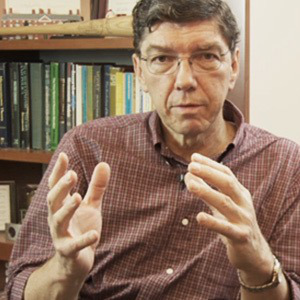(单词翻译:单击)
He may have been right about disk drives, mechanical excavators and steel mills. But Clayton Christensen, whose theory of disruptive innovation underpins much of current business management thought, was wrong about Apple.
克莱顿o克里斯坦森开创的颠覆性创新理论(disruptive innovation),也许适用于磁盘驱动器、机械挖掘机和炼钢厂,但遇到苹果(Apple)时,这项被当前许多企业管理思想作为基石的理论就不灵了。
Not just in 2006, when he foresaw the imminent demise of the iPod. Or in 2007, when he said that the iPhone would not succeed. Or in 2012, when he predicted that Apple’s integrated iPhones and iPads would succumb to Samsung’s and Google’s modular approach.
他曾经在2006年预测iPod即将消亡,在2007年表示iPhone不会取得成功,也曾在2012年预测称,集成化的iPhone和iPad最终将败给三星(Samsung)和谷歌(Google)的模块化产品。

“Christensen is going to go zero for three,” quipped Stratechery‘s Ben Thompson in September.
科技博客Stratechery的撰稿人本o汤普森在今年9月表示:“克里斯坦森的三个预测没有一个正确。”
Christensen has been taking his lumps lately, and not just in the blogosphere. In June he was attacked at length in The New Yorker by a fellow Harvard academic, Jill Lapore, who cataloged errors and oversights in his seminal texts: The Innovator’s Dilemma(1997) and The Innovator’s Solution (2003).
近来,克里斯坦森遭受了不少笔诛口伐,而且不仅仅是在博客圈。今年6月,他的哈佛大学(Harvard University)同事吉尔o拉波尔在《纽约客》(The New Yorker)杂志上发表了长篇檄文,猛烈批判克里斯坦森,文中还引用了克里斯坦森著作《创新者的窘境》(The Innovator’s Dilemma,1997年出版)和《创新者的解决之道》(The Innovator’s Solution,2003年出版)中的错误和纰漏。
Lapore was largely dismissed in tech circles as a history professor who knew little about managing high tech and less about the nature of academic theories.
拉波尔是一位历史学教授,对如何管理高科技公司并不在行,更不用说研究相关领域的学术理论了,因此他的批评并未受到科技圈的广泛关注。
Not so easily dismissed are more recent critiques by tech experts like Ben Thompson (What Clay Christensen got wrong) or Ben Bajarin (Disrupting Disruption Theory) or Jean Louis Gassée (Clayton Christensen becomes his own devil’s advocate).
然而最近,来自科技专家本o汤普森的文章《克雷o克里斯坦森错在哪里》、本o巴加林的《推翻颠覆性创新理论》、以及简o路易斯o加斯撰写的文章《克雷o克里斯坦森是其自身魔鬼的拥护者》,也纷纷提出了批评。他们可就不容易被忽视了。
Or, for that matter, Horace Dediu, one of Christensen’s most prominent defenders.
甚至连克里斯坦森最知名的拥护者霍雷斯o德迪欧,现在也站到了质疑者的行列。
Dediu has made a career of popularizing Christensen’s ideas, spreading the gospel of disruption in his Asymco blogs, his Critical Path podcasts and his Airshow padcasts. The theory, he says, draws its narrative strength from one of mankind’s oldest stories: The rise of the underdog. David and Goliath. The weak defeating the strong.
德迪欧一直以普及克里斯坦森的思想为己任,在他的博客Asymco、播客Critical Path和Airshow上竭力传播颠覆性创新理论福音。他表示,这一理论从落魄者的崛起、大卫击败歌利亚、弱者击败强者等等这些人类最古老的故事中汲取了叙事力量。
Yet in a discussion on Bajarin’s Techpinions podcast last month, even Dediu had to admit that Christensen’s theory must be adapted to fit the market for consumer tech. “When it comes to consumers,” he says, “there are some twists to the plot.”
然而,上月在参加巴加林的播客Techpinions进行的一个讨论时,甚至连德迪欧也不得不承认,克里斯坦森的理论必须有所调整,才能适应科技消费品市场。他表示:“一旦涉及到消费者,情况就会有些变化。”
The problem, Thompson, Bajarin and Dediu all agree, is that the theory emerged from an analysis of business-to-business markets where purchase decisions are made by business managers, not consumers. Business managers tend to make rational decisions that have more to do with dollars and cents than with the experience of using a product.
汤普森、巴加林和德迪欧都承认,问题的根源在于,这套理论源于克里斯坦森对B2B市场(即企业对企业市场)所做的分析。在这个市场中,做出购买决定的是企业管理者,而不是消费者。企业管理者做出的理性决策往往是基于经济方面的核算,而非使用产品的体验。
Consumers care about dollars and cents too, but they also care about a host of other factors — things like ease of use, brand loyalty and what their friends are using. Marketing departments spend millions to understand the subtle differences that make consumers buy one product and not another. It’s a well-studied field. Most tech companies, however, know nothing about it.
消费者也重视金钱,但他们同样重视一系列其他因素——易用性、品牌忠诚度,以及他们的朋友会使用什么产品。营销部门动辄花费数百万美元来了解促使消费者做出不同购买决定的细微差异。这是一个被深入研究的领域。然而,大部分科技公司对此还一无所知。
“What Apple figured out,” Dediu says, “is that if they learned just 10% of what is known about how consumers behave and applied some of that theory to their products, they could make them more desirable to average people.”
德迪欧表示:“苹果的发现是:只要他们能掌握仅仅10%的消费者行为学知识,并活学活用,他们就能生产出对普通大众更具诱惑力的产品。”
It helped, according to Dediu, that Steve Jobs was an “instinctive disruptor.”
德迪欧说,这很管用,史蒂夫o乔布斯是“天生的颠覆者”。
Dediu is bullish about Apple Watch, even though the attraction of the luxury watch market escapes him. He already finds himself at sea in contemporary shopping malls, where there is almost nothing he wants to buy and where 95% of purchase decisions are being made not on the basis of functionality, but for purely psychological reasons.
德迪欧很看好苹果手表,尽管奢侈品手表市场对他没什么吸引力。他发现在当今的购物商场中,他有些无所适从,他几乎没有想买的东西,而95%的购买决定都不是基于功能需求,而是纯粹的心理需求。
“Why are people in this shop and not the shop next door that seems to be selling the same products?” he asks toward the end of the podcast. “These things are mysterious to me.”
在播客讨论的最后,他问道:“为什么人们会在这家店里,而不是在销售同样产品的隔壁店里买东西?对我来说,这是件神奇的事情。”(财富中文网)


